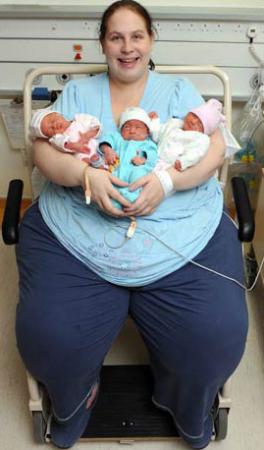导读:一项引起广泛社会关注的新研究发现:孕期过于肥胖的妇女生出的孩子患自闭症的风险较高。研究结果显示,孕期肥胖的妇女生出自闭症孩子的风险要比孕期体重正常的妇女高出67%,同时,她们的孩子还面临着双倍发育迟缓的风险。

一项引起广泛社会关注的新研究发现,孕期过于肥胖的妇女生出的孩子患自闭症的风险较高。该研究在线发表在4月9日的Pediatrics杂志上。
这几乎是第一项将二者(肥胖与自闭症)联系起来的研究,尽管它并未证实肥胖会导致自闭症。研究人员说他们的结果引起了大家对公共健康的高度关注,因为肥胖在这个国家是如此普遍。
研究结果显示,孕期肥胖的妇女生出自闭症孩子的风险要比孕期体重正常的妇女高出67%,同时,她们的孩子还面临着双倍发育迟缓的风险。
“平均而言,每88个妇女就会生出1个自闭症患儿,即概率为1/88;而孕期肥胖的妇女则将此概率提高到1/53。”论文作者说。
由于美国有超过1/3的育龄妇女深受肥胖困扰,所以这项结果足以让人们不安,同时也为人们减肥提供了一个新的动力。论文作者之一的、加州大学的Paula Krakowiak说。
之前的研究就曾将孕期肥胖与死胎、早产及出生缺陷联系在一起。
儿童发育和行为学博士Daniel Coury(并未参与此项研究)说这项发现“引起了人们的高度重视”。
他注意到,美国自闭症患病率逐年增长的同时,肥胖率也在不断增长,这项研究表明,二者之间并不是简单的巧合。
“当然,现在下定论为时过早,要证实这项结果还需要更多的后续研究。但是,即使妈妈孕期肥胖果真被证实与孩子患自闭症有关联,那也只是众多影响因素之中的一个。”Coury说。
自闭症被认为与基因有关,同时,科学家们还在研究孕期妈妈的疾病及用药是否也是影响因素之一。
该项研究对加州的 1000多个2~5岁的儿童进行了研究——其中700个患有自闭症或者发育迟缓,剩下的315则没有上述问题。
研究人员咨询了妈妈们的身体状况,并获取了其中一半多妈妈的病历卡,从而确认了她们的健康情况。作者们目前还不清楚妈妈的肥胖到底会对胎儿发育产生怎样的影响,但他们提供了如下理论:
“超过正常体重35磅以上,我们称之为肥胖。肥胖患者容易产生炎症、有时血糖会升高。妈妈血液中的多余血糖及炎症相关物质会进入胎儿体内并损害其大脑。”Krakowiak说。
可惜的是,该项研究缺乏这些妇女孕期血检、饮食和其他可能会影响胎儿发育的行为的信息。
研究人员说:“我们排除了其他任何可能影响研究结果的因素,如种族、文化或健康保险差异等。”

Maternal Metabolic Conditions and Risk for Autism and Other Neurodevelopmental Disorders
Paula Krakowiak, Cheryl K. Walker, Andrew A. Bremer, Alice S. Baker, Sally Ozonoff, Robin L. Hansen and Irva Hertz-Picciotto
OBJECTIVE: We examined whether metabolic conditions (MCs) during pregnancy (diabetes, hypertension, and obesity) are associated with autism spectrum disorder (ASD), developmental delays (DD), or impairments in specific domains of development in the offspring.
METHODS: Children aged 2 to 5 years (517 ASD, 172 DD, and 315 controls) were enrolled in the CHARGE (Childhood Autism Risks from Genetics and the Environment) study, a population-based, case-control investigation between January 2003 and June 2010. Eligible children were born in California, had parents who spoke English or Spanish, and were living with a biological parent in selected regions of California. Children’s diagnoses were confirmed by using standardized assessments. Information regarding maternal conditions was ascertained from medical records or structured interview with the mother.
RESULTS: All MCs were more prevalent among case mothers compared with controls. Collectively, these conditions were associated with a higher likelihood of ASD and DD relative to controls (odds ratio: 1.61 [95% confidence interval: 1.10–2.37; odds ratio: 2.35 [95% confidence interval: 1.43–3.88], respectively). Among ASD cases, children of women with diabetes had Mullen Scales of Early Learning (MSEL) expressive language scores 0.4 SD lower than children of mothers without MCs (P < .01). Among children without ASD, those exposed to any MC scored lower on all MSEL and Vineland Adaptive Behavior Scales (VABS) subscales and composites by at least 0.4 SD (P < .01 for each subscale/composite).
CONCLUSIONS: Maternal MCs may be broadly associated with neurodevelopmental problems in children. With obesity rising steadily, these results appear to raise serious public health concerns.
文献链接:








